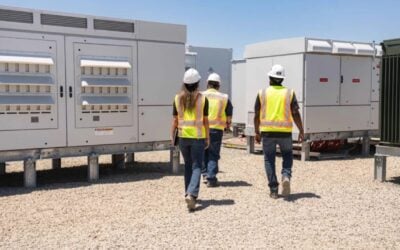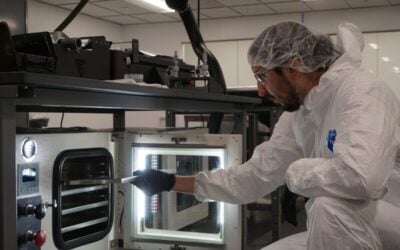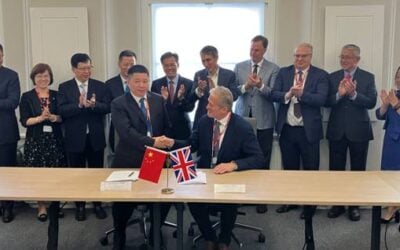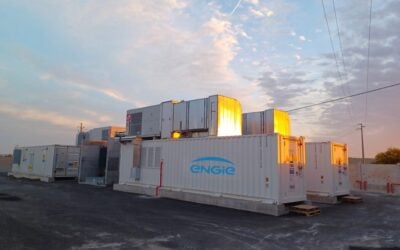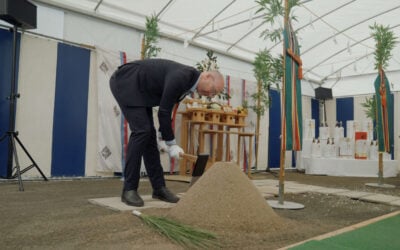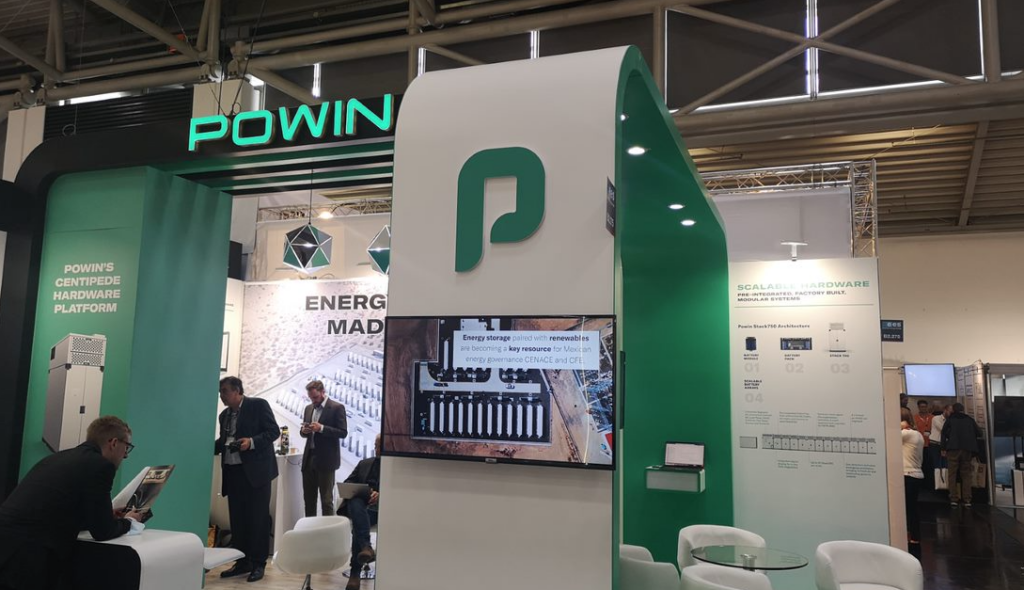
Powin Energy is “very close” to announcing its first US battery storage factory, while the company is working to extend its reach into new markets including the UK.
Danny Lu, executive VP at the Oregon-headquartered battery storage system integrator and manufacturer, spoke with Energy-Storage.news at last week’s Energy Storage Summit EU in London, hosted by our publisher Solar Media.
Enjoy 12 months of exclusive analysis
- Regular insight and analysis of the industry’s biggest developments
- In-depth interviews with the industry’s leading figures
- Annual digital subscription to the PV Tech Power journal
- Discounts on Solar Media’s portfolio of events, in-person and virtual
“We started exploring Europe last year at the Intersolar conference, we’ve made some relationships with UK developers and IPPs,” Lu said.
“We’ve been actively bidding in the UK market and have had some early success, been shortlisted on a few projects, have been in exclusive negotiations on a few projects.”
While the company hasn’t built any UK projects yet, it is seeing a pipeline of more than a gigawatt-hour of grid-scale battery energy storage system (BESS) contracts that would be for delivery in the late 2023-2024 timeframe.
Though Lu characterised the company’s UK business development activities as initially successful in bringing its value proposition and cost structure, there are some barriers to entry into the booming market over the pond.
Having delivered more than 3GWh of US projects, Powin has a pretty good track record since bringing its first utility-scale BESS online in 2016, but UK customers want to know about UK experience.
Another thing is that from the company’s point of view, it considers its lithium iron phosphate (LFP) technology to be better suited for 2-hour durations, rather than the 1-hour projects that have been typical of the UK. This appears to be changing, with analyst Mollie McCorkindale of Solar Media Market Research writing in a recent Guest Blog for this site that the market in Great Britain is now trending towards longer durations than an hour.
Something else that sets the UK apart from the US is that UK developers and other customers want to see contracts come fully-wrapped including engineering, procurement and construction (EPC). Whereas the US, for the most part, moved away from wraps roughly five years ago.
“In the US, since five years-plus ago, we were always doing side-by-side contracts, where developer would contract with us to provide the integrated storage solution, hardware and software. Then the EPC would just strictly provide the construction, civil works, high voltage, and those would be contracted separately,” Lu said.
“What we’re realising in the UK is that a lot of developers are requesting one company to wrap the construction, the integration, hardware, software, and all the long-term performance guarantees, which then adds a lot of perceived risk onto the EPC. How they mitigate that risk, is to charge a higher markup.”
In the US, risk is therefore lowered on the EPC side, and put more onto the developer for long-term performance, but it also puts some of the risk onto the system integrator. That change in contracting structure can lower costs by around 10% alone, Lu claimed.
While Powin has done those type of wrap deals in the past, working with Honeywell and Mitsubishi Power, for example, the integrator realised that that “adds huge layers of costs on top and it also adds a bit of a communication barrier, where we cannot communicate directly with the customer in many cases”.
From the UK customers’ perspective, the wrap offers a degree of comfort in the shared risk. In cases where Powin suggested eliminating the wrap solution, customers instead asked for other structures such as bonding or extra insurance. “a lot of different bankability levers,” as the executive VP called them.
Why expand when US market is set for an IRA-driven boom?
Powin is working on Australia’s biggest battery project to date, the Waratah Super Battery, which took some steps forward last week, as reported by Energy-Storage.news. There are also two other big Australia projects the company and its partners have secured grid connections for.
The integrator is also active in other markets like Taiwan and India, and has a strong demand base in the US which is only set to grow its addressable market hugely as the Inflation Reduction Act’s investment tax credit (ITC) incentives kick in.
So why target continued international expansion at this inflection point in its home market?
“The US is like a baseload market for us, in a sense,” Lu said.
“Without the US, our demand would be very ‘lumpy’, and lumpy demand makes supply chain a bit harder to manage. Having a very steady base load allows us to keep production happening, always consistently, never stopping.”
It helps too that the US market has seen high levels of competition, bringing down prices considerably, whereas in less mature markets, higher margins are still to be found.
With that international expansion comes a ramp up of its manufacturing scale too. Powin’s strategy is to “set up as many contract manufacturing facilities around the world,” as it can and “increase our capacity to always meet the maximum demand that we potentially see year-over-year,” Danny Lu said.
“The manufacturing side of things is really about finding strategic locations around the world that can support local markets that we can eliminate transport costs. The volatility of transport costs over COVID, I think that’s levelling out now, but we’ve realised that transport can actually make a big portion of the costs or erosion of your own margin.”
Powin started off with one wholly owned factory in China, before setting up a plant in Taiwan. Then more recently it began contract manufacturing with OEM Celestica at a site in Mexico, where mass production began around two months ago.
In addition to a factory in Vietnam close to opening up, and another on the way in China, Powin has one factory in US that it is very close to announcing, Lu said, where the company’s Stack modular solutions, combined into multi-megawatt scale on Powin Centipede platform, will be built.
“All of these factories will be multi gigawatt-hour per year scale, and each will have the ability to expand by adding another shift on the line, there’s space in each of these facilities to add another line when needed,” Danny Lu said.
Energy-Storage.news’ publisher Solar Media will host the 5th Energy Storage Summit USA, 28-29 March 2023 in Austin, Texas. Featuring a packed programme of panels, presentations and fireside chats from industry leaders focusing on accelerating the market for energy storage across the country. For more information, go to the website.

